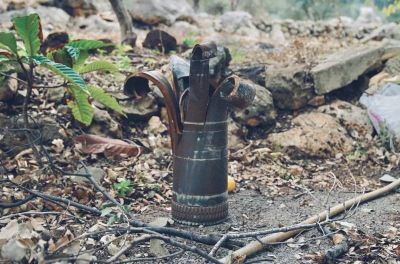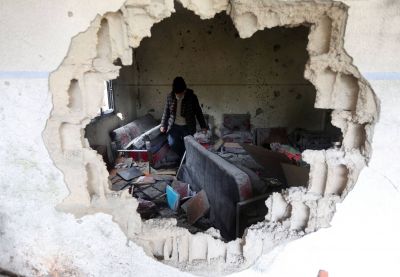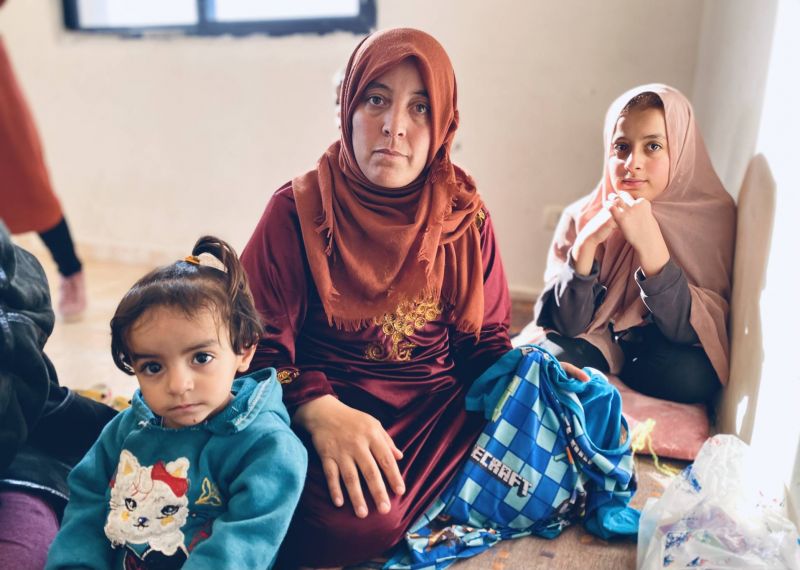
Samira with her young children in an apartment in the town of Chtoura, in the Bekaa Valley, Lebanon. Nov. 23, 2023. (Credit: Olivia Le Poidevin/L'Orient Today)
CHTOURA, Bekaa — In the Lebanese town of Chtoura, east Lebanon, Abdallah and his family, originally from Syria, huddle inside a sparsely furnished room of the former dental clinic that has become their temporary home.
Abdallah rubs his cold hands together while his wife and two children sit cross-legged on a worn-down mattress, which they found on the side of the road.
They arrived in the Bekaa Valley some 30 days ago, after the south Lebanon border town that they had briefly called home, Mais al-Jabal, was struck by Israeli shells.
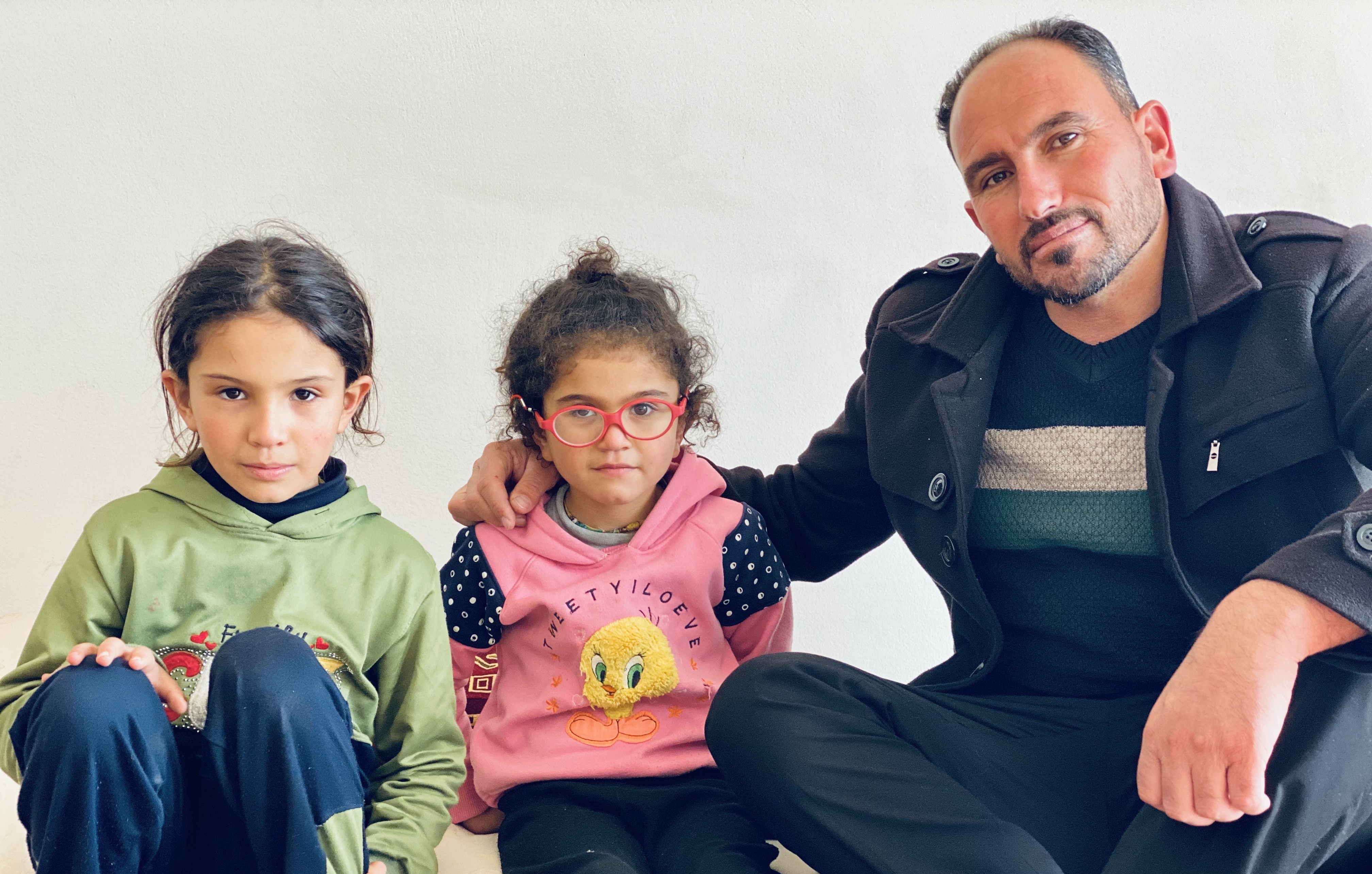 Abdallah and his daughters in their temporary accommodation in Chtoura in the Bekaa Valley, Lebanon. Nov. 23, 2023. (Credit: Olivia Le Poidevin/L'Orient Today)
Abdallah and his daughters in their temporary accommodation in Chtoura in the Bekaa Valley, Lebanon. Nov. 23, 2023. (Credit: Olivia Le Poidevin/L'Orient Today)
"We left our blankets and our clothes and fled. The bombings were targeting all vehicles without distinction, between military and civilians," Abdallah tells L'Orient Today.
Abdallah and his family are among the 50,000 people who have been displaced from southern Lebanon due to daily exchanges of fire between Hezbollah and Israel, according to United Nations data. The bombardments briefly calmed down during the truce, but have recommenced. Now many Syrians displaced by the fighting find themselves in a dead end: forced to flee to new areas of Lebanon for safety, yet unable to return to their home country, having fled the war in Syria, which killed nearly half a million people since it started in 2011.
Faced with the impending winter cold, high rent prices and no jobs, these newly displaced Syrian families tell L'Orient Today that they are struggling to make ends meet as they take temporary shelter in the Bekaa Valley.
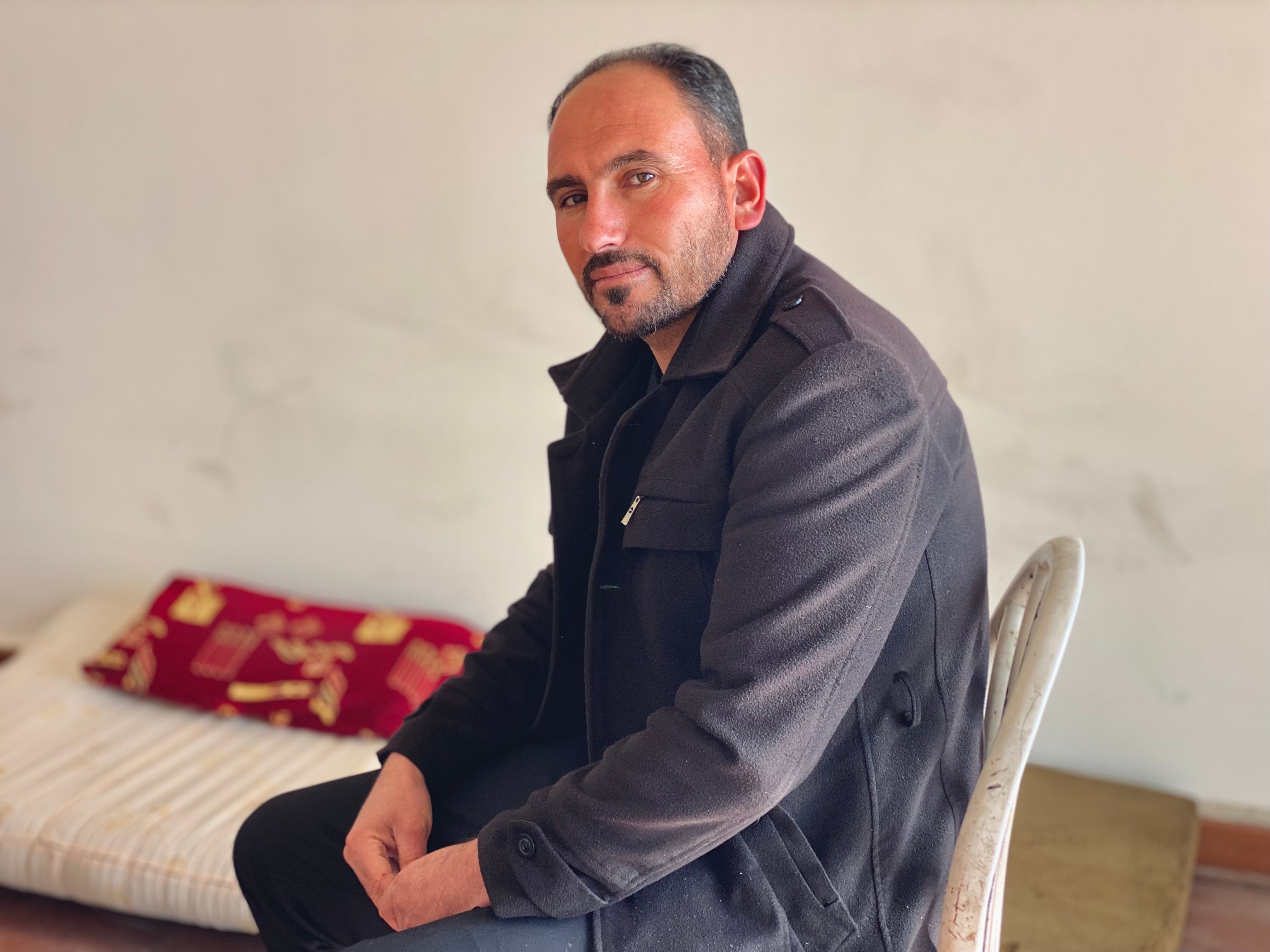 Abdallah, a Syrian man who has fled fighting in southern Lebanon, sits on a chair in his temporary accomodation in Chtoura in the Bekaa, LebanonThe sparsely furnished room of Abdallah and his family's temporary accommodation in Chtoura in the Bekaa, Lebanon. Nov. 23, 2023. (Credit: Olivia Le Poidevin/L'Orient Today)
Abdallah, a Syrian man who has fled fighting in southern Lebanon, sits on a chair in his temporary accomodation in Chtoura in the Bekaa, LebanonThe sparsely furnished room of Abdallah and his family's temporary accommodation in Chtoura in the Bekaa, Lebanon. Nov. 23, 2023. (Credit: Olivia Le Poidevin/L'Orient Today)
‘My children wet themselves from fear’
"Wherever they [Israeli army] would strike in the south, we'd feel like the ground would shake beneath us … The bombing became very intense," Abdallah recounts.
Mais al-Jabal and surrounding villages have been regularly bombarded by the Israeli army, amid ongoing exchanges of fire with Hezbollah.
Abdallah's two daughters, aged nine and 10, are still traumatized.
"We were shaking in fear thinking we might get bombed. They started to wet themselves from the fear. Now they wake up startled in the middle of the night fearing the drones," Abdallah says, looking over at his daughters.
"They’ve already had this trauma from living the war in Syria, so it was like a double trauma," he adds. The family eventually fled south Lebanon, leaving everything behind — including their home, and Abdallah’s job as a porter.
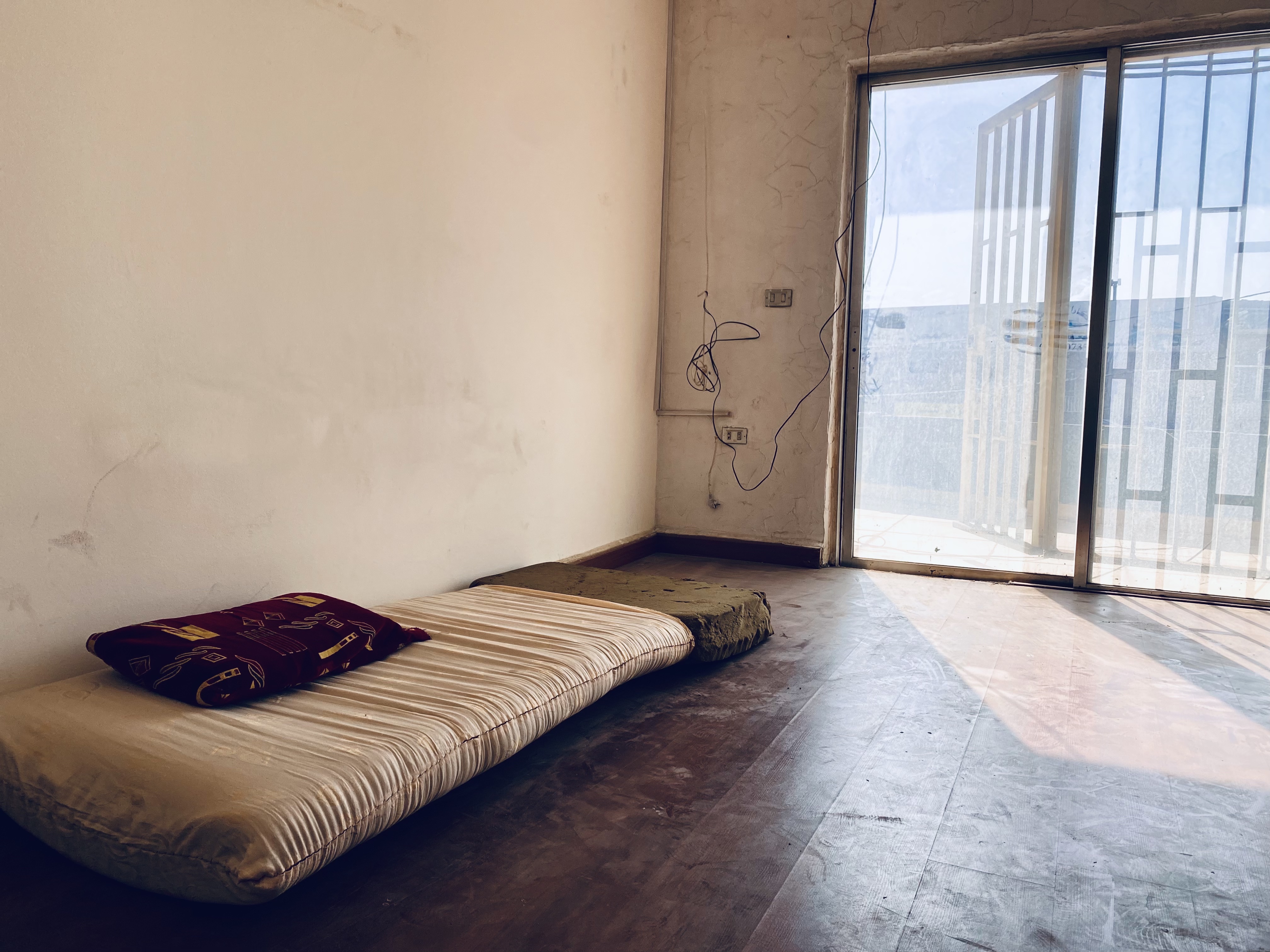 The sparsely furnished room of Abdallah and his family's temporary accommodation in Chtoura in the Bekaa, Lebanon. Nov. 23, 2023. (Credit: Olivia Le Poidevin/L'Orient Today)
The sparsely furnished room of Abdallah and his family's temporary accommodation in Chtoura in the Bekaa, Lebanon. Nov. 23, 2023. (Credit: Olivia Le Poidevin/L'Orient Today)
‘We are looking for safety anywhere’
Lebanon hosts 1.5 million Syrian refugees, 800,000 of whom are formally registered with the Office of the United Nations High Commissioner for Refugees (UNHCR). About 89,168 registered Syrian refugees were living in southern Lebanon before Oct. 7.
It’s not yet clear how many of them have been displaced by the recent fighting.
Fleeing has become a routine for Abdallah and his family. In 2011 his relatively peaceful life in Hasakeh, northeast Syria, where he worked in farming, descended into chaos.
Then, in 2014, ISIS took over his village. US-led coalition forces “bombed everything,” he says. “In 2016, my daughter got killed by a strike; a shell fragment hit her head. Our house got totally destroyed," adds Abdallah with his brow furrowed.
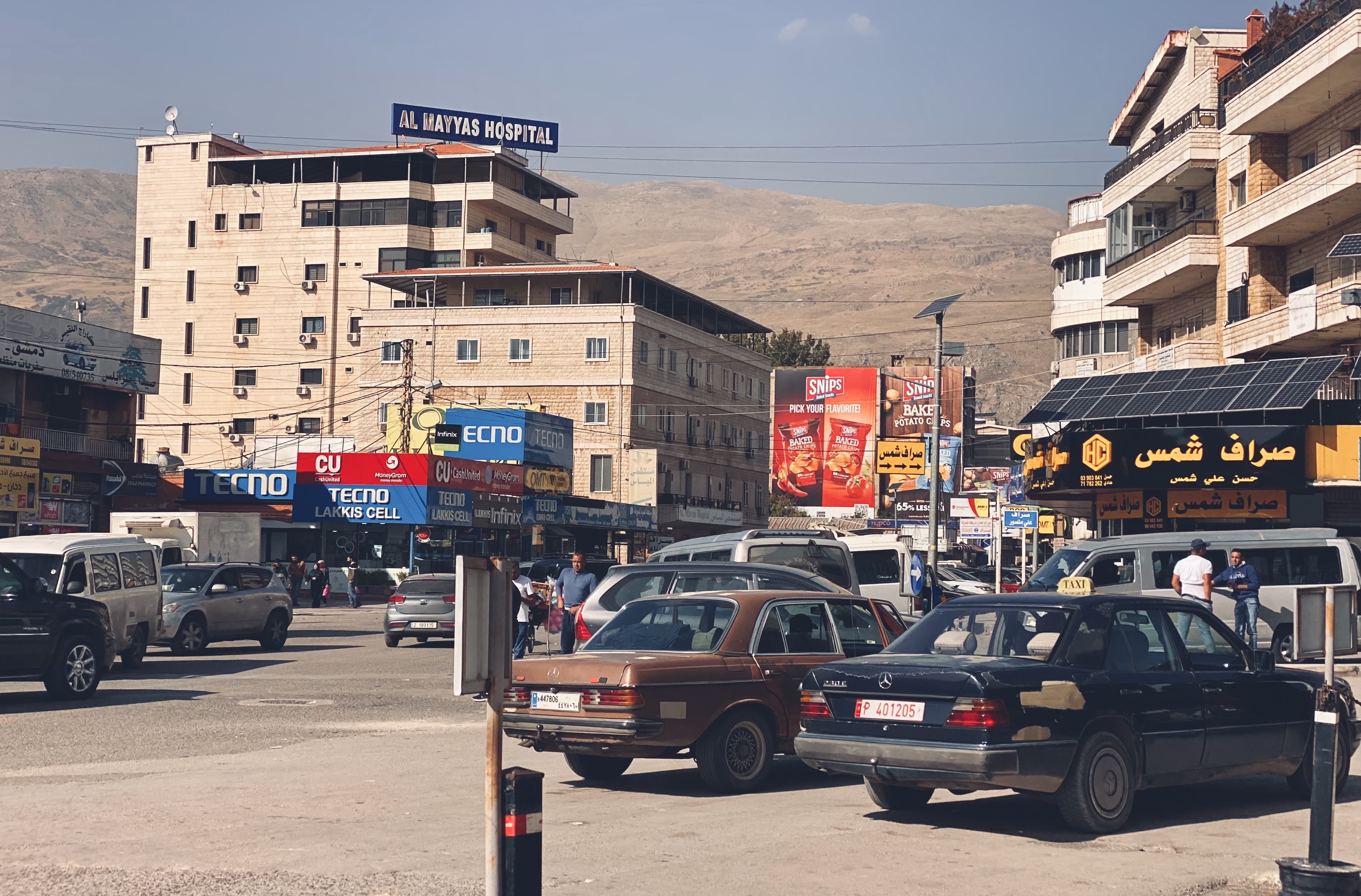 The town of Chtoura, in the Bekaa, Lebanon. The sparsely furnished room of Abdallah and his family's temporary accommodation in Chtoura in the Bekaa, Lebanon. Nov. 23, 2023. (Credit: Olivia Le Poidevin/L'Orient Today)
The town of Chtoura, in the Bekaa, Lebanon. The sparsely furnished room of Abdallah and his family's temporary accommodation in Chtoura in the Bekaa, Lebanon. Nov. 23, 2023. (Credit: Olivia Le Poidevin/L'Orient Today)
In 2021, he fled to Lebanon. After multiple moves within the country, he eventually found a home in Mais al-Jabal this past May, where got his porter job, cognizant that returning to Syria is not an option.
"We do not have a home in Syria to go back to. We are looking for safety anywhere."
‘Now we are facing difficulties in Lebanon’
Since Lebanon's economic crisis started in 2019, Lebanon's political establishment has been calling for Syrians to return home, citing increased pressure on the state's resources. In May, Human Rights Watch claimed that the Lebanese Armed Forces "arbitrarily arrested and summarily deported" thousands of Syrians between April and May 2023.
Caretaker Foreign Minister Abdallah Bou Habib told his Syrian counterpart in October that the return of Syrians is important to "restore security and stability" in Lebanon. For the last two years government policy has said that no new camps and tents can be erected for refugees, meaning newly displaced Syrians have limited options on where to go.
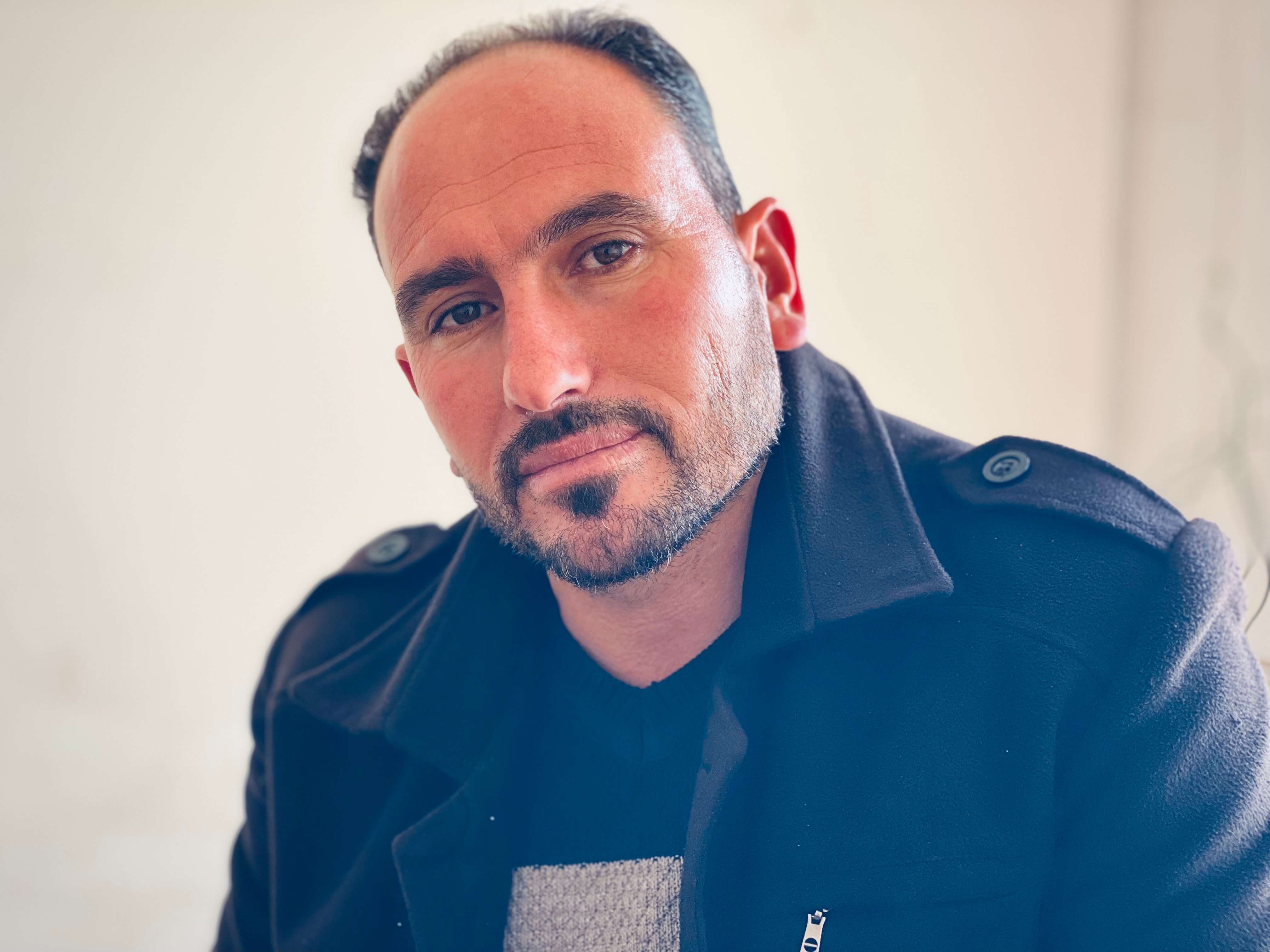 Abdallah, a Syrian man who has fled fighting in southern Lebanon in Chtoura in the Bekaa, LebanonThe sparsely furnished room of Abdallah and his family's temporary accommodation in Chtoura in the Bekaa, Lebanon. Nov. 23, 2023. (Credit: Olivia Le Poidevin/L'Orient Today)
Abdallah, a Syrian man who has fled fighting in southern Lebanon in Chtoura in the Bekaa, LebanonThe sparsely furnished room of Abdallah and his family's temporary accommodation in Chtoura in the Bekaa, Lebanon. Nov. 23, 2023. (Credit: Olivia Le Poidevin/L'Orient Today)
"No one will accept Syrians coming from the south [in the camps]. So we had to come to towns like Chtoura, where there is less questioning or restriction. We are here because we consider it safe, it’s in the middle of town," says Abdallah.
Their other concern is financial. "We cannot afford rent,” he says, even for the dental clinic. “It's 150$ for a two-room flat."
Their room today is cold, the thin window allowing the crisp wind to come through. Winter is only beginning.
"I am living in tragedy, I am mentally, physically and emotionally drained. I’m thinking of how to get a heater. How to get the diesel for the heater, how to eat. We are eating just to survive. No fruits, not even a manaoushe, there is no income."
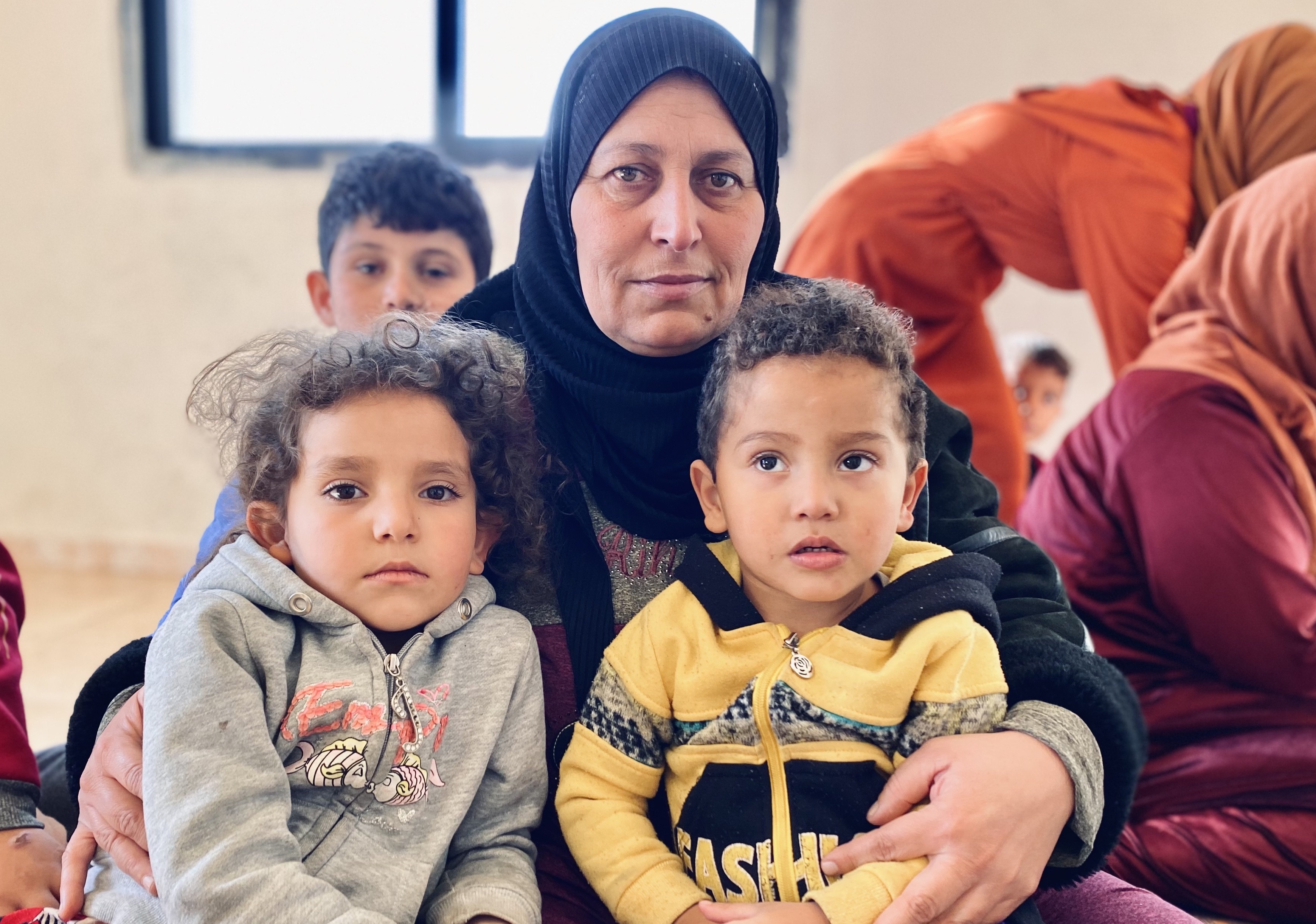 Turkiyeh with her young children in a temporary apartment in the town of Chtoura, in the Bekaa, Lebanon. The sparsely furnished room of Abdallah and his family's temporary accommodation in Chtoura in the Bekaa, Lebanon. Nov. 23, 2023. (Credit: Olivia Le Poidevin/L'Orient Today)
Turkiyeh with her young children in a temporary apartment in the town of Chtoura, in the Bekaa, Lebanon. The sparsely furnished room of Abdallah and his family's temporary accommodation in Chtoura in the Bekaa, Lebanon. Nov. 23, 2023. (Credit: Olivia Le Poidevin/L'Orient Today)
On top of that, he says, “so far there hasn’t been any organization that assisted us in our current situation."
‘We couldn’t stay under the bombs’
Near the dental clinic, Turkiyeh and Samira, the mothers of two Syrian families, are about to prepare lunch in their new temporary home in Chtoura. On a small gas stove, they'll cook the remains of a few vegetables, mopped up with whatever bread remains in the pile on the floor in the empty, unfurnished apartment.
In 2016 Turkiyeh, a mother of eight children, fled Syria through Palmyra to Damascus in a cattle car. She travelled for five day, before being smuggled to Beirut through the mountains.
"ISIS had sieged us. They started to decapitate people and hang them on the roundabout. So we fled," she tells L'Orient Today.
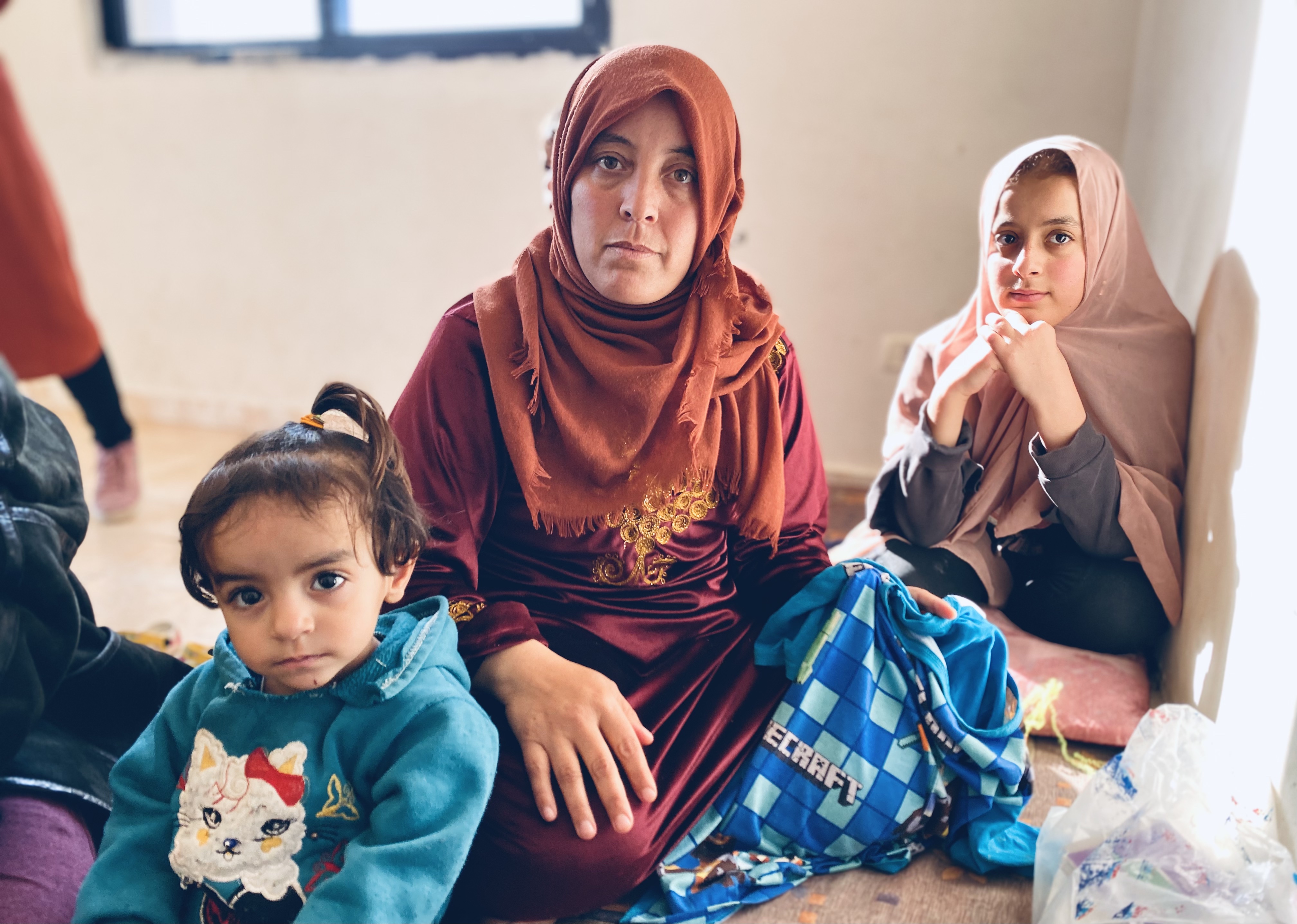 Samira with her young children in a apartment in the town of Chtoura, in the Bekaa, Lebanon. The sparsely furnished room of Abdallah and his family's temporary accommodation in Chtoura in the Bekaa, Lebanon. Nov. 23, 2023. (Credit: Olivia Le Poidevin/L'Orient Today)
Samira with her young children in a apartment in the town of Chtoura, in the Bekaa, Lebanon. The sparsely furnished room of Abdallah and his family's temporary accommodation in Chtoura in the Bekaa, Lebanon. Nov. 23, 2023. (Credit: Olivia Le Poidevin/L'Orient Today)
For seven years she had been living in Mais al-Jabal and Houla in southern Lebanon, where her husband worked as a porter and cleaner. That was until the shells started to fall.
"My children were sitting in one corner together, screaming. Israel targeted houses, civilians, anything that moves," she says. Her children sit around her, watching her talk.
While other villagers, mainly of Lebanese nationality, left, Turkiyeh and her family stayed. "We were scared; we can’t go back to our country, our homes have been taken. So where are we supposed to go?”
"There were no more shops, nothing. We couldn’t stay under the bombs," adds Samira, a mother of 12. She had been living in Houla, another town in southern Lebanon.
They couldn't afford to stay in the city of Sour, in the south, as rent prices were more than double what they could afford. “We spent one night on the street in a car we had rented. We then slept in the streets," she added. They then drove to Chtoura, and found an apartment that costs $300 per month, with no electricity.
‘There is no more support’
"I burnt my leg with the kettle, I went everywhere and no one would treat me unless I paid 30$," says Samira, recalling an incident about a week ago. She still has burn marks and dark bruises. Turkiyeh describes how one aid organization came to visit them but has not come back. "There is no more support.”
According to Hassan Mahmoud from the nearby Salam Community Center in Ksara, few organizations have had the means to plan for this "new problem” — an unexpected war that has, overnight, displaced Lebanese and Syrians alike.
So far, the Salam center has been able to register seven families for classes that it hopes to offer for Syrian children.
Still, Mahmoud says, “it’s hard for organizations to disseminate information on how people can access services to find shelter or food...[Syrians] don’t know where they would go to find it. So they either need to be found by someone, or referred.”
The situation is likely to worsen. From the start of 2024, the United Nations will cut the number of refugee families receiving cash assistance in Lebanon by nearly a third, due to less funding, the Associated Press has reported. This is putting more pressure on organizations like Salam.
“We are at full capacity. We are using every room and time slot,” says Mahmoud.
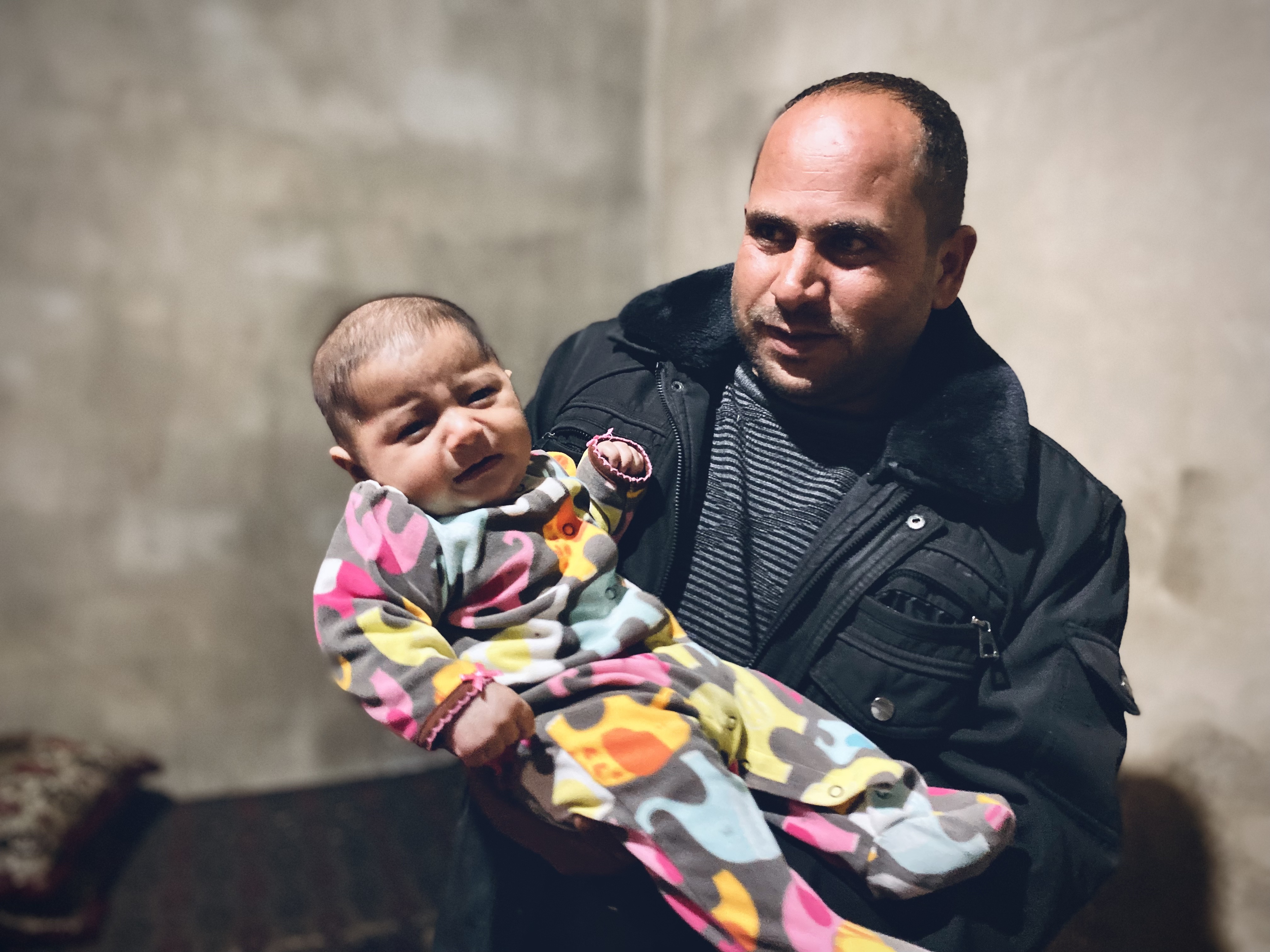 Joud with his three month old baby, at a relatives' home near Ksara, Lebanon. The sparsely furnished room of Abdallah and his family's temporary accommodation in Chtoura in the Bekaa, Lebanon. Nov. 23, 2023. (Credit: Olivia Le Poidevin/L'Orient Today)
Joud with his three month old baby, at a relatives' home near Ksara, Lebanon. The sparsely furnished room of Abdallah and his family's temporary accommodation in Chtoura in the Bekaa, Lebanon. Nov. 23, 2023. (Credit: Olivia Le Poidevin/L'Orient Today)
Escaping death, now homeless
Joud was harvesting olives when his car was struck by an Israeli shell in Aitaroun, in the caza of Bint-Jbeil.
"We were about 100 meters away from the car. There was me, my wife, my two boys, my three-year-old daughter and my three-month-old baby. We almost died. They were targeting anything that moved," he says. Shrapnel from the shell wounded him.
Originally from Syria’s Idlib governorate, Joud is not a refugee from the Syrian war, but moved to Lebanon in 2001 for work. Since 2012 he has not been able to return home due to the fighting, so Aitaroun had been home — until early October when the situation deteriorated.
"I thought to myself if I stay, it’s dangerous, and if I leave, I’m going to be homeless", he said. After being injured by the shrapnel, Joud and his family were transported by the Red Cross and UNIFIL to Majdal Selem further north, before he had to decide where to go next.
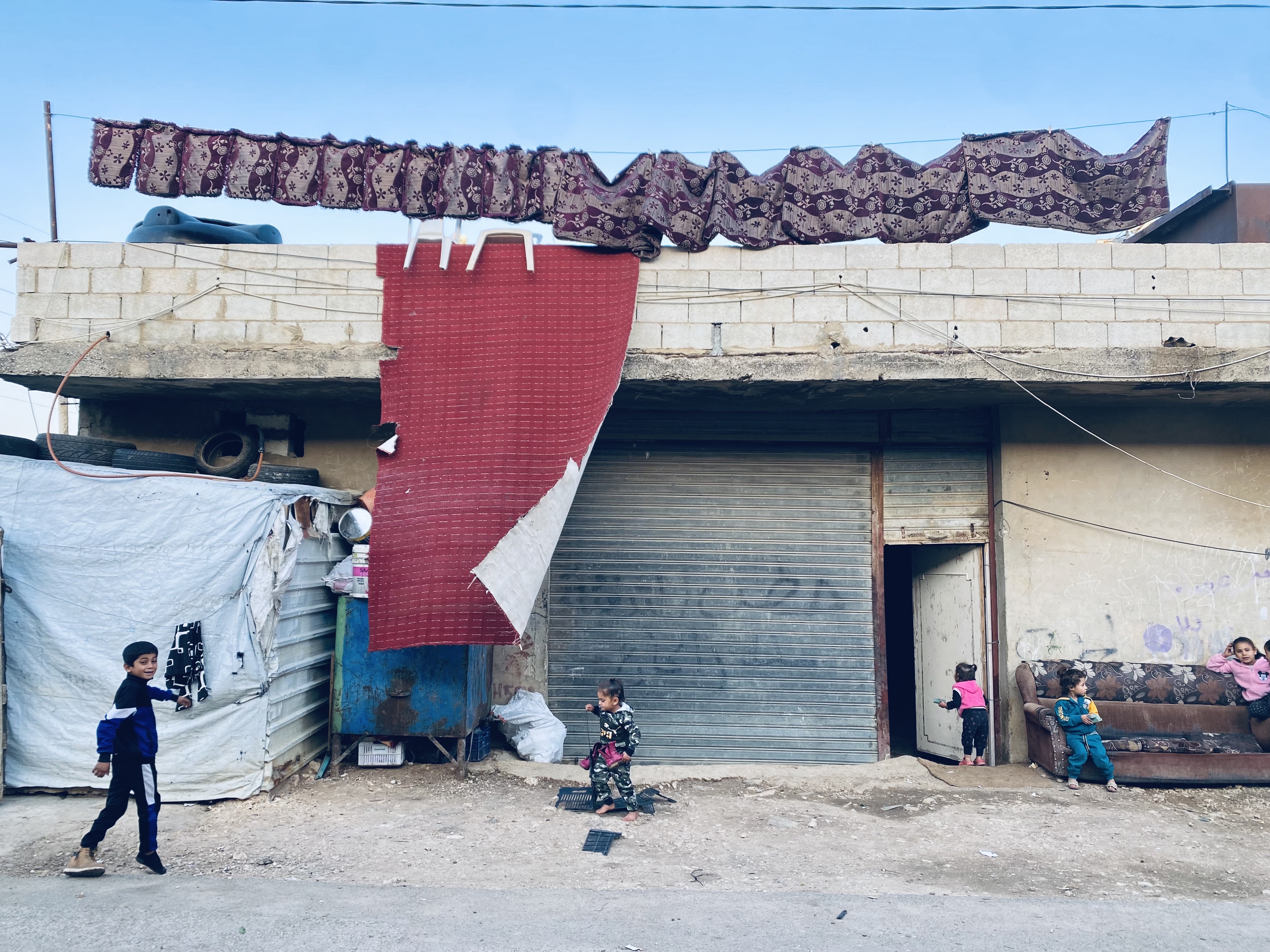 Outside Joud's relatives' home near Ksara, Lebanon.The sparsely furnished room of Abdallah and his family's temporary accommodation in Chtoura in the Bekaa, Lebanon. Nov. 23, 2023. (Credit: Olivia Le Poidevin/L'Orient Today)
Outside Joud's relatives' home near Ksara, Lebanon.The sparsely furnished room of Abdallah and his family's temporary accommodation in Chtoura in the Bekaa, Lebanon. Nov. 23, 2023. (Credit: Olivia Le Poidevin/L'Orient Today)
"I heard that Syrians were told that they couldn’t come into the [nearby] village of Rmeish and that they should leave," he claimed. L'Orient Today has not been able to independently verify this claim. Mohammad Hasan, the Executive Director of the advocacy NGO Access Center for Human Rights says he has heard similar reports. He also raises the fear of Syrians of being detained by Lebanese authorities while on the move.
Many refugees are afraid to apply for help via Lebanese authorities when they move to different areas, for fear of detention, Hasan explains.
"It has become evident that Lebanon is not interested in providing any protection to refugees...We anticipate that discrimination against Syrian refugees could worsen in the event of any military developments in Lebanon," he adds.
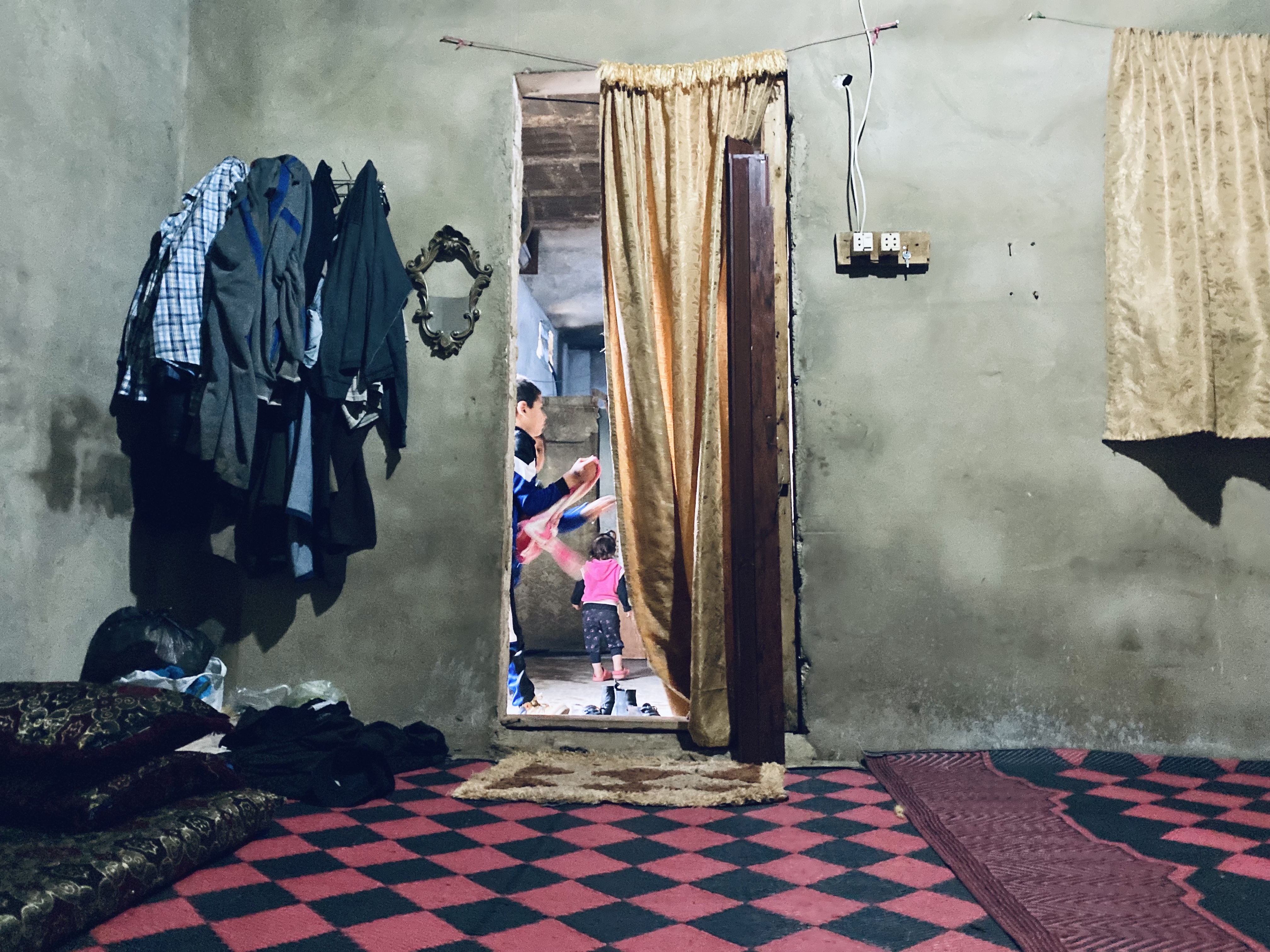 Inside Joud's relatives' home near Ksara, Lebanon. The sparsely furnished room of Abdallah and his family's temporary accommodation in Chtoura in the Bekaa, Lebanon. Nov. 23, 2023. (Credit: Olivia Le Poidevin/L'Orient Today)
Inside Joud's relatives' home near Ksara, Lebanon. The sparsely furnished room of Abdallah and his family's temporary accommodation in Chtoura in the Bekaa, Lebanon. Nov. 23, 2023. (Credit: Olivia Le Poidevin/L'Orient Today)
With limited help from both the state and NGOs, Joud is currently staying in a cramped house belonging to his wife's father, near the town of Ksara. But he soon will have to move. There are 15 of them there, and they are running out of space. Walking through the entrance to his temporary home, he shuffles through the dark into the main room, there are no windows, and the walls are damp.
"I am looking for work in the fields, but I will earn $3 per day. And with $3 I can only pay for the milk for my baby." He says needs $200-300 monthly to make ends. But with no help in sight, Joud faces a long road to get back on his feet, not knowing when or if he will be able to return to his newfound home in southern Lebanon.
